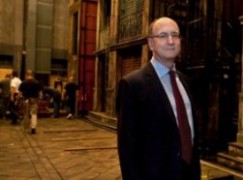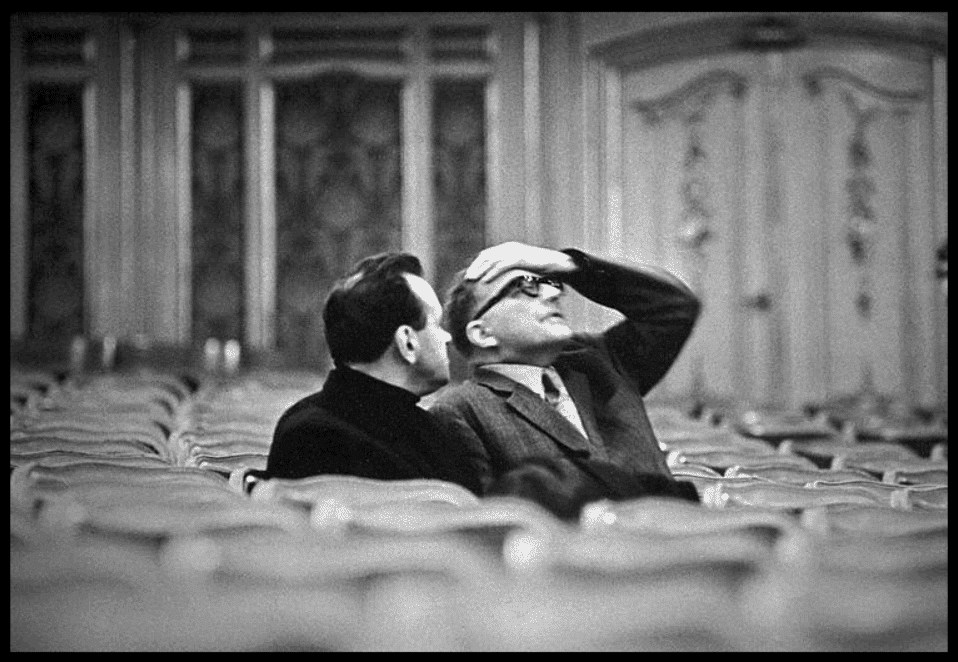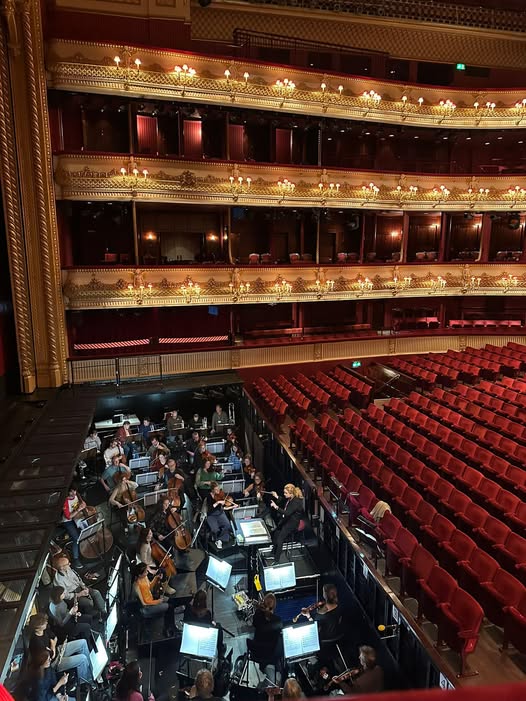Slippedisc editorial: It’s not about Gelb’s pay. It’s about vision.
mainThe Metropolitan Opera’s showdown with its unions took a fresh terms yesterday when newly-released tax filings showed that the manager, Peter Gelb, earned 1.8 million in 2012 and has just taken a voluntary 10 percent pay cut. He wants the unions to trim 16 percent.
These discrepancies aroused a spate of shock-horror stories in New York’s newspapers, where Gelb has lost the war before a shot was fired. He has turned instead for soft treatment to the British media, but his comments are not encouraging.
When Gelb got the big job back in 2006, he promised to propel the Met into the 21st century by revitalising its repertoire, getting in movie directors, putting opera on the big screen and generally making it a place fit for entertainment and inspiration.
In the latest interviews, he makes it sound like a mausoleum.
Gelb’s pessimism about the survival of opera is the dominant tone emerging from the Met. There is no light at the end of his tunnel. It may be that Gelb has done all he can. Regardless of the outcome of the union talks, what the Met needs is a boss with vision, a positive outlook on the future. It may be that Gelb has to go.






I have written before on several threads about Mr. Gelb’s conflicting statements re his job and the prospects for his company. I will not repeat them here. His pay, though, is a different issue. Looking at the pay of executive directors of US symphony orchestras on the adaptistration blogsite, his pay does not seem especially excessive given the nature of the job and the budget he controls – or perhaps we should say, he fails to control.
The latest figures available show the LA Philharmonic CEO was paid $1,602,228 in 2011/12. Next is the NY Phil at $887,401 followed by the Philadelphia at $768,271 with the Boston, Cleveland, Chicago and San Francisco Orchestras quite a bit behind.
But compare Gelb’s pay with that of the new Royal Opera CEO which was announced as around $410,000 for 2013/14, and he is not only vastly overpaid; on the basis of the relative success/failure of the two Houses, he should definitely be shown the door!
“When Gelb got the big job back in 2006, he promised to propel the Met into the 21st century by revitalising its repertoire, getting in movie directors, putting opera on the big screen and generally making it a place fit for entertainment and inspiration.”
OR. How about trust the opera. Trust the composer and the librettist of the standard repertoire. They survive the test of time because they are the best of the genre. If you want to be experimental and cinematic, do that with newly commissioned works, as Opera of St. Louis does.
By putting the emphasis on how the opera looks, especially how it must look on HD, Gelb in a short time has taught the audience to look for the wrong things and thus they have stopped measuring the success of the performance by the singing. No wonder they are disappointed even when great performances are delivered by the the finest performers in the country. If they want production values and cinematic excitement, the audience knows they are much more likely to find that on Broadway or in the movie theaters. And guess what? They are clearly showing their preference with their wallets.
“It may be that Gelb has to go.”
Well, not if the board has just signed a 10-year contract with him, as WSJ reports.
I totally agree with this article. I also think it’s reflective of the entire industry. Appealing to new audiences is about more than putting opera in the cineplex. It’s about getting to know how these new media channels are affecting arts engagement fundamentally. I think many of the business practices inside of opera, from hiring, to marketing, to operations are seriously flawed and inflated especially given the state of the major economies and the social trends that have emerged as a result of new media. The fact is Opera is a niche product, but it lives like it’s mainstream. Opera is simply too costly to maintain at its current scale. That in large part has to do with continuing to appeal primarily to “elites” who are either not interested or a large enough an audience to sustain it. Sure outreach efforts have been made, but they are ineffective because the gatekeepers are out of touch with what new audiences actually THINK about Opera. This would require looking to new models of audience engagement besides $30 cheap seats in nose bleed sections, or overwrought “contemporary interpretations.” For Opera to continue forward, it will need to be significantly scaled back, reconfigured in its operations, and then properly marketed to new audiences. I think it’s a vision that is certainly attainable. If Gelb, being in New York City of all places, cannot find some help to this result, then he should step aside for someone with new ideas.
Carla, I agree with you. Especially with the last sentence in your comment. The problem is, however: Mr. Gelb does not want help. Anthony Tommassini, The Met’s Royal Correspondent Critic at the New York Times, dared to suggest creating the position of an Artistic Director a few years ago. Gelb’s response: “I am the artistic director” – with emphasis on “I”. So there you have the answer. Maybe the Met needs to hit the rocks before anything changes. As the WSJ noted, the board renewed Gelb’s contract for another 10 years. Where they want the company to be in those 10 years is anyone’s guess. That said, the current turbulent time may harbor the opportunity for smaller regional companies to do surprising, unusual, and attractive things. The Metropolitan Opera, meanwhile, could be added to the vast collection of the Metropolitan Museum….
But I think they are actually *planning* on hitting the rocks, at least for the Sept. thru Dec. portion of next season.
Excellent comments Carla and Edgar. And I totally agree with this article. Thank you, Norman.
I do not understand how the Met Board can’t see how limited and self-defeating Gelb has become in the last year. He stands the possibility of crucially damaging his brand and his product if he continues with this ridiculous talk about no one being interested in opera.
Yes. It’s clear he wants to be seen as the “Artistic Director.” He seems to be concerned with spending and saving without considering the audience except to pout “they don’t like us anymore.” That’s complete garbage. He’s just too preoccupied to actually engage people. So then the Board needs to impose new operations, marketing and PR “officers” too “assist” Gelb on how his big ideas are being played out. They may have signed a new contract with Gelb, but that doesn’t mean that others who already exist within the MET framework can’t be leveraged to shall we say “streamline” Gelb’s responsibilities. He seems to have too much free reign. What is the point of having a Board of Directors, if they aren’t directing the organization? In any organization, nothing goes well without a strong collaborative team. In non-profit, it is the job of the Board to see that the mandate of the organization is being fulfilled. At the end of the day, that mandate is to make great opera productions, and the objective is to get bums in the seats, again and again.
According to the WSJ, the average full-time member of the Met Orchestra made $200,000, plus $85,000 in benefits. The concertmaster made nearly $400,000; three members of the stage hands made $450,000 (they are in leadership positions). So, is Gelb’s salary out of hand? I don’t think so, based on what others are making in the organization.
That being said, I think what is out of hand is the cost structure in general.
The Met Board: They no longer seem to be a ‘neutral’ body with the best interests of the Met (or of opera in general) at heart, but rather a collective of the super-rich who have fallen under some kind of spell cast by Gelb.
The salaries of some of the union people working at the Met may seem high, but in part this stems from length of service; if you stick with a ‘corporation’ for 2 or 3 decades your salary builds just from annual raises if nothing else.
Living in the New York City area on a $200,000 per year salary: after taxes, it’s not really all that much. Compared with pro athletes, it’s paltry.
Somehow I imagine Gelb could manage to live in modest comfort on $750,000 a year. It doesn’t really matter what other people in comparable positions make: if he truly cares about getting the Met thru this crisis he should lead by example.
Blogger Scott Chamberlain has an excellent response to Gelb.